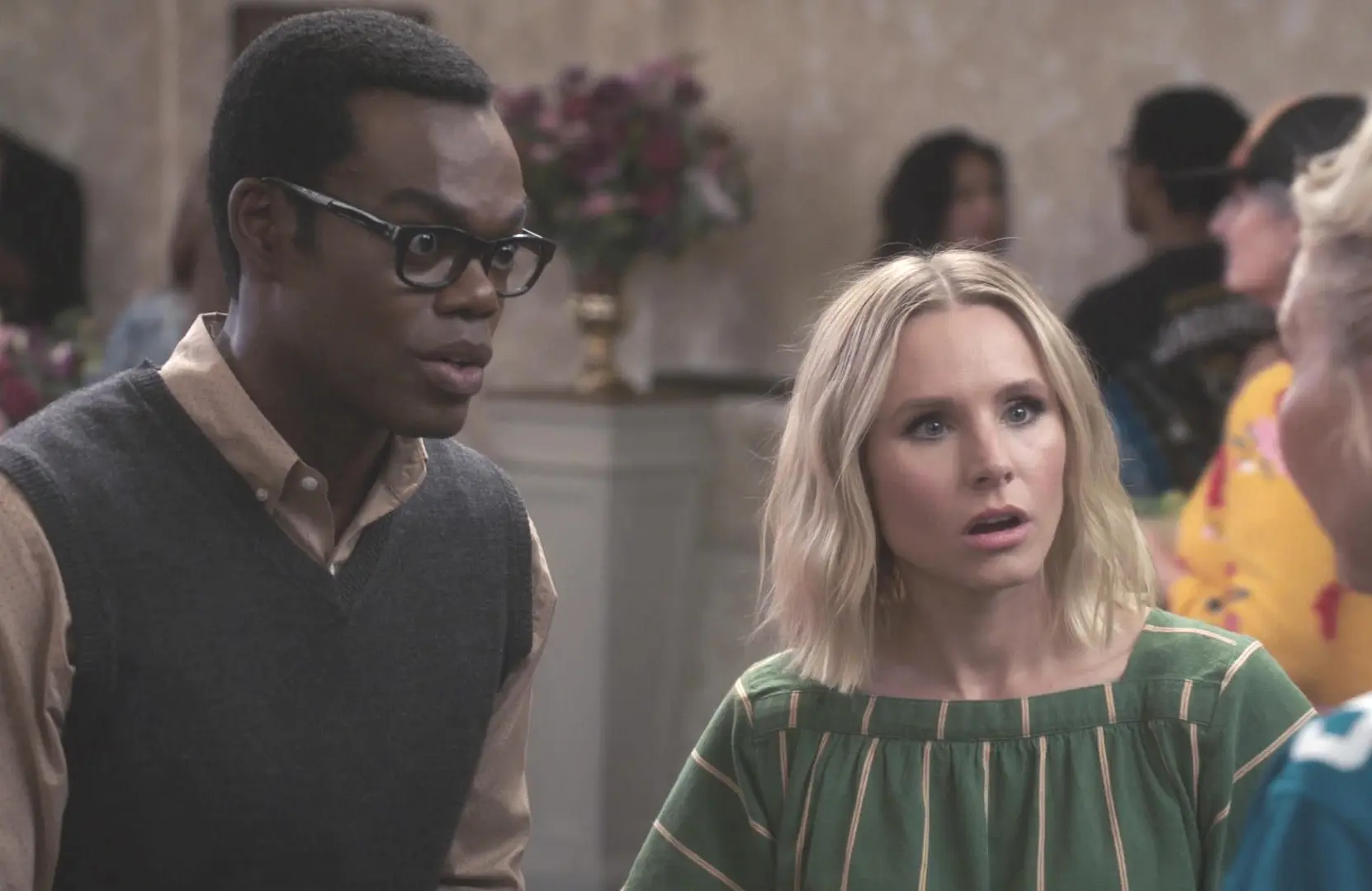The Good Place's Endgame Offers a Perfect Netflix Metaphor
-
 William Jackson Harper and Kristen Bell in The Good Place. (NBC)
William Jackson Harper and Kristen Bell in The Good Place. (NBC)As NBC's The Good Place ends its run this week, it's giving the entire entertainment journalism establishment free reign to use as many "gone to heaven" metaphors as they can. Across its four seasons, there have been a myriad declarations about what the show has meant to the TV landscape. Last year, Vulture called it the quintessential show of the Tump era, and that sentiment has been echoed again this week. Time, meanwhile, called it the last great network sitcom. One thing about The Good Place that's been simmering just beneath the surface for years, but which only came into sharp focus with last week's penultimate episode is that The Good Place is the Netflix-iest of the great network comedies.
What's more, last week's great Good Place dilemma — essentially, how to make Heaven compelling when there are no more stakes — presented a fantastic metaphor for living in the everything-is-available streaming age.
This was no doubt accidental, although it shouldn't be completely surprising. Throughout its run, The Good Place has been by far the least network-y of network sitcoms. Network TV has pushed boundaries over the years, prodded by advancements and experiments on cable and streaming platforms, but nothing quite as full-bodied as what The Good Place has been doing since minute one. The Good Place has been so (rightly) lauded for its humanity and intelligence that what got overlooked was its format: a fully serialized sitcom, not just maintaining ongoing stories and character development, but telling one twisting, turning, shape-shifting story over the course of four seasons, is such a rarity on network.
Truly, The Good Place has been the closest a network sitcom has come to the Netflix model since the big, red machine first hung its original content shingle seven years ago. Think of the way Good Place episodes end — with crucial plot developments often happening in the final seconds, under the hurried, network-mandated credits. Think of the way one episode's resolution leaves you dying to start the next episode right away. Think about the way the show's momentum builds on itself week to week as the story moves forward, complicating itself and the task ahead of its protagonists at every turn.
Last week's episode, "Patty," saw our band of protagonists finally admitted to the real Good Place, for really real this time, no takebacks, no dream sequences... heaven, at last. Except there was still a whole episode — not to mention the one hour-plus series finale — to go, so obviously there was going to be a problem. The problem, best expressed by guest star Lisa Kudrow, is this: it's Heaven, it's perfect, you want for nothing, all your questions are answered, all your desires met. And it lasts forever. But that, says Kudrow's character — Hypatia, an ancient philosopher/atronomer/mathematician who was so cool that Rachel Weisz once played her in a movie — was the problem. With everything available to the residents of The Good Place and an unlimited amount of time to enjoy it, their minds got soft and they got bored. With paradise.
Now don't dump your cup of shrimp from the shrimp dispenser on me, but that whole situation struck me as not at all unlike the current moment in streaming television. Everything is available to us: new sitcoms, dramas, documentaries and reality shows are coming at us every week. Netflix is the most content-stuffed entity television has ever seen, with Sabrina the Teenage Witch, Queen Elizabeth from The Crown, and the isolated angels of The Circle all intermingling. It's not just these new shows, either. Streaming TV and VOD offers us the chance to watch nearly any TV show that's aired in our lifetime, and probably a good bunch from before that. And yet … there's no urgency to it. The satisfaction of having all these shows at your fingertips is trumped by the fact that it never feels like you need to watch them. Sometimes, a new show will provide that kind of urgency for a moment — as The Circle has done this month — but it dissipates with every subsequent week amid an even newer pile of TV offerings.
How many times have you fretted over being left out of the loop on a TV show, only to wait a week and the idea of watching that show is already receding from your mushy brain. Sex Education? I'll get to it eventually. Castle Rock on Hulu? It'll be there forever; why go out of my way to make that kind of commitment now? Might as well have this milkshake and forget about it.
The solution on The Good Place to all this infinite bliss is to put some finality to it. They installed a door where you could walk through and end your afterlife experience. You don't have to walk through it, but if you decide to, that would be that. That was all it took to give The Good Place some stakes. (And it may end up leading this week's finale, titled "Whenever You're Ready," to follow our protagonists' own decisions to walk though that door.)
Look, we're not saying that everybody needs to decide to set an end date for their Netflix subscriptions. But if you knew you were going to lose Netflix forever in 30 days' time, what shows would you make sure you watched?
People are talking about The Good Place finale in our forums. Join the conversation.
Joe Reid is the senior writer at Primetimer and co-host of the This Had Oscar Buzz podcast. His work has appeared in Decider, NPR, HuffPost, The Atlantic, Slate, Polygon, Vanity Fair, Vulture, The A.V. Club and more.
TOPICS: The Good Place, NBC, Netflix, Lisa Kudrow